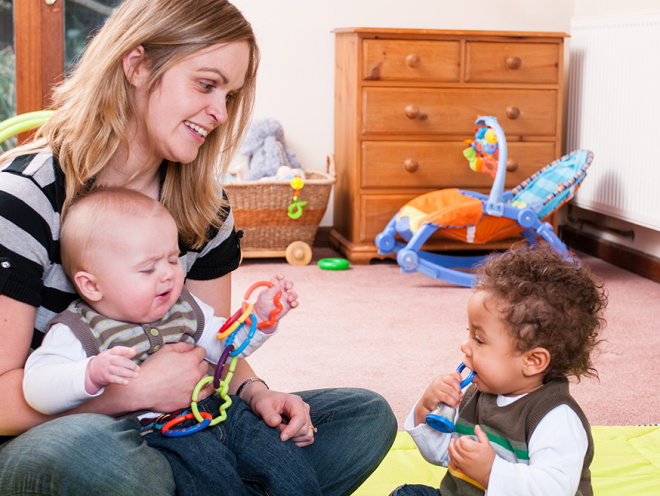Childminders can be a good option for parents looking for homely childcare and a flexible approach to suit their working hours. Here are the details…
What is a childminder?
Childminders care for small groups of children of different ages in their own home (PACEY, 2019). The children usually come from different families and sometimes include the childminder’s own children.
Parents usually choose a childminder because they can offer a ‘home away from home’ and more flexible drop off and pick-up times than nurseries.
How are childminders regulated?
Childminders in England must be registered with Ofsted or an Ofsted-registered Childminder Agency; in Scotland with the Care Inspectorate; and in Wales with the Care and Social Services Inspectorate Wales (CSSIW). To qualify, they must complete a first aid course and a local authority-approved childminder training course.
How much do childminders charge?
Childminders set their own rates and these can vary. Your local council’s website may have information about current rates for childminders in your area.
As long as your childminder is registered, you will be able to make use of your Childcare Vouchers or the new Tax-Free Childcare scheme and claim your working tax credits or universal credit.
How can I be sure a childminder is safe?
Your childminder will be inspected at least once every three years to make sure they continue to offer good quality care. They’re also inspected to make sure they are following the Early Years Foundation Stage curriculum (see below). If you have a registered childminder, you can be reassured that:
- they have completed an approved training course (including children’s first aid)
- their home has been assessed for suitability
- any other adults living there have been background checked.
If they’ve also chosen to join a ‘quality assurance scheme’ run by your local council or the Professional Association for Childcare and Early Years, they’ll do additional training (PACEY, 2019).
Do registered childminders all follow The Early Years Foundation Stage?
Yes. All childcare providers registered with Ofsted follow this curriculum. The Early Years Foundation Stage (EYFS) sets the standards for learning development and care for children from birth to five years of age. This means that you can expect your child’s development to be aided by creative play and activities.
Why choose a childminder?
- They’re more likely to be able to fit around your hours.
- You get to know the person looking after your child.
- Continuity of, and more personal, care – no ‘staff turnover’ to consider.
- You can gauge their ‘values’ and see if they match your own.
- You can ask them about their approach to routines and discipline – how will they reward, how will they discourage?
- They provide a home setting, rather than ‘school-like one’ where plans can often be altered to suit your child’s mood/needs.
How do I find and choose a childminder near me?
- Word of mouth – talk to other local parents about their choices.
- Visit the Government website to find a local list of registered childminders.
- Look up a childminder’s latest Ofsted report.
What questions could I ask a childminder before I get started?
- Will they charge if your child is ill or on holiday?
- What’s included in their costs: meals, nappies, days out?
- What happens if the childminder – or any of her children – are ill?
- What are their arrangements for bank holidays?
Be sure to request a contract from your childminder. It should cover their hours, rates of pay, additional costs for meals or activities, holiday arrangements and what will be done for emergency cover.
You may want to visit two or three childminders before deciding. Look around their house, and see what toys, books and equipment your child will be playing with. Are they clean? Does it all look safe? Perhaps take your child along with you and see how they fit in. As with most things your instinct as well as more formal checks will guide you.
This page was last reviewed in October 2018, amended November 2023
Further information
Our support line offers practical and emotional support in all areas of pregnancy, birth and early parenthood: 0300 330 0700.
Make friends with other parents-to-be and new parents in your local area and see what NCT activities are happening nearby.
You might find attending one of our NCT New Baby groups helpful as they give you the opportunity to explore different approaches to important parenting issues with a qualified group leader and other new parents in your area.
Childcare must be registered with Ofsted (England), the Care Inspectorate Scotland and the Care and Social Services Inspectorate Wales (CSSIW).
Information on the Early Years Foundation Stage can be found here.
PACEY (Professional Association for Childcare and Early Years). (2019) Childminders. https://www.pacey.org.uk/working-in-childcare/childminders/ [Accessed 1st March 2019]








